#al saud
Text

#mustshare#sharethis#must watch#pray for palestine#free palestine#i stand with palestine#end genocide#ceasefire#boycott israel#pray for gaza#the worst of evil#israel is a terrorist state#israel are the real terrorists#fuck you biden#fuck the idf#fuck israel#al saud
38 notes
·
View notes
Text
He had 10 twitter followers.
Finnish people please sign this Amnesty petition.
3 notes
·
View notes
Text
youtube
Despite reading dozens of books on Saudi Arabia, the Saudi monarchy, and several biographies of Mohammed bin Salman, I must admit how surprised I am that MbS's actual speaking voice sounds exactly like Tom Hardy's posh accent in Inception. It's quite jarring at first.
#Mohammed bin salman#MbS#Saudi Arabia#Saudi Crown Prince#Crown Prince Mohammed bin Salman#MbS Interview#Fox News#Bret Baier#House of Saud#Saudi Royal Family#Saudi Monarchy#al Saud#Kingdom of Saudi Arabia#Politics#Middle East#Arab Monarchs#Arab History#Youtube
6 notes
·
View notes
Text

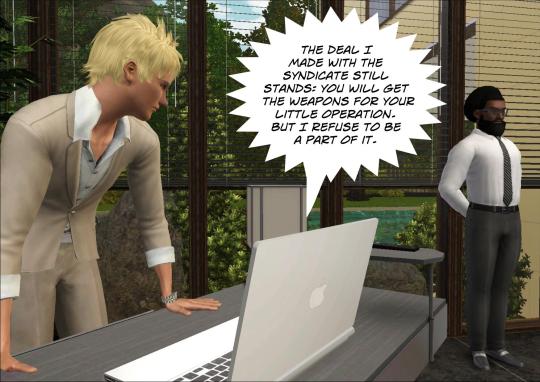







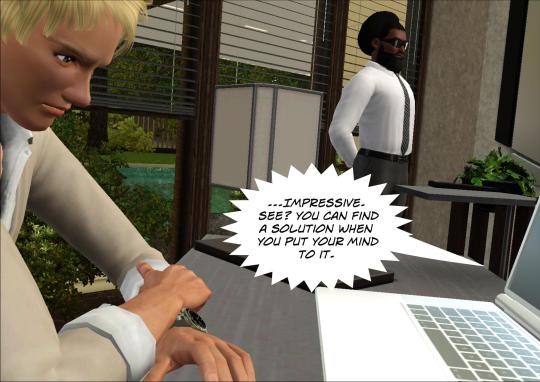


Author's note: Reference is made to the following scenes: (1), (2), (3)
#ts3#sims 3#sims 3 story#sims stories#tteot story#laurie golzine#omar ayad#muhammad al-saud#i'm sorry for going into details#i hate doing that#look i work in investment but imposter syndrome is kicking me hard#plus it's kind of difficult to make a plot look seamless when there is so much time between updates#in summary: laurie is managing a conglomerate including an investment fund of which noah is a partner#so laurie is a shareholder of a small tech company through that fund#he sold the antivirus via noah to that company as a solution to the virus he developed himself#when the stock market got hacked (by laurie) all companies rushed to get an anti-virus#but it also contained a spyware (also by laurie)#and this is how laurie's main business is now stealing data#laurie arc
68 notes
·
View notes
Text

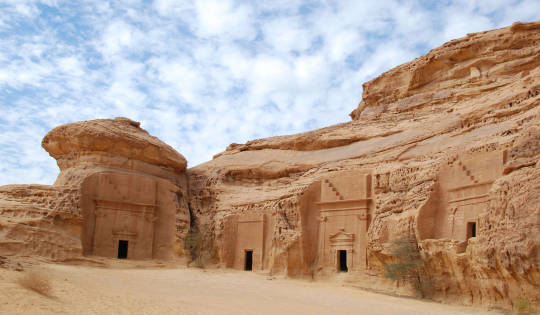

Mada'in Saleh, Al Ula, Saudi Arabia.
This is where the surah of Al-Hijr from the Qur'an was said to have taken place.
303 notes
·
View notes
Text
Saudi Arabia's Foreign Minister Faisal bin Farhan Al Saud clearly explaining the simple truth and reality of this, asserting Palestinians right to their own land, to live in safety and security with freedom and self determination: "The weight has to be lifted, but it is not to be lifted by the Arab world. It is to be lifted by removing that weight and that is very easy: by stopping the killing, by stopping the blockade, by allowing enough humanitarian aid to go in to support the Palestinians.
The Palestinians do not want to leave their land. And we are not going to encourage them or force them to leave their land and we are not going to work with anyone who has that agenda.
The Palestinians have a right to their land, and they have a right to live in safety and security and dignity on their land. And that is what we will push for and that is what we will work towards."
#Faisal bin Farhan Al Saud#Saudi Arabia#Palestinians#Palestine#Free Palestine#Arab#Gaza#Free Gaza#Free the West Bank#The West Bank#Israel#Israel is a terrorist state#Genocide#Ethnic cleansing#War crimes#International law#Human rights#Human rights violations#Watermelon 🍉#🍉 🇵🇸#Watermelon#israel is committing genocide#israel is an apartheid state#israel is a war criminal#Illegal invasion#Illegal occupation#Illegal settlement#Colonialism#settler colonialism#apartheid
55 notes
·
View notes
Text

©saud-al-olayan
#jeep#jeep life#©saud-al-olayan#jeep nation#jeep world#its a jeep thing#jeep for life#jeep community#jeep wave#jeep addict#off road life#off road#4x4
106 notes
·
View notes
Text

#free gaza#free palestine#gaza strip#irish solidarity with palestine#palestine#gaza#news on gaza#al jazeera#boycott israel#israel#Faidal bin Farhan Al Saud#Saudi Arabia#Rafah
26 notes
·
View notes
Text
The social media company formerly known as Twitter has been accused in a revised civil US lawsuit of helping Saudi Arabia commit grave human rights abuses against its users, including by disclosing confidential user data at the request of Saudi authorities at a much higher rate than it has for the US, UK or Canada.
The lawsuit was brought last May against X, as Twitter is now known, by Areej al-Sadhan, the sister of a Saudi aid worker who was forcibly disappeared and then later sentenced to 20 years in jail.
It centers on the events surrounding the infiltration of the California company by three Saudi agents, two of whom were posing as Twitter employees in 2014 and 2015, which ultimately led to the arrest of al-Sadhan’s brother, Abdulrahman, and the exposure of the identity of thousands of anonymous Twitter users, some of whom were later reportedly detained and tortured as part of the government’s crackdown on dissent.
Lawyers for Al-Sadhan updated their claim last week to include new allegations about how Twitter, under the leadership of then chief executive Jack Dorsey, willfully ignored or had knowledge of the Saudi government’s campaign to ferret out critics but – because of financial considerations and efforts to keep close ties to the Saudi government, a top investor in the company – provided assistance to the kingdom.
The new lawsuit details how X had originally been seen seen as a critical vehicle for democratic movements during the Arab spring, and therefore became a source of concern for the Saudi government as early as 2013.
The new legal filing comes days after Human Rights Watch condemned a Saudi court for sentencing a man to death based solely on his Twitter and YouTube activity, which it called an “escalation” of the government’s crackdown on freedom of expression.
The convicted man, Muhammad al-Ghamdi, 54, is the brother of a Saudi scholar and government critic living in exile in the UK. Saudi court records examined by HRW showed that al-Ghamdi was accused of having two accounts, which had a total of 10 followers combined. Both accounts had fewer than 1,000 tweets combined, and contained retweets of well-known critics of the government.
The Saudi crackdown can be traced back to December 2014, as Ahmad Abouammo – who was later convicted in the US for secretly acting as a Saudi agent and lying to the FBI – began accessing and sending confidential user data to Saudi Arabian officials. In the new lawsuit, it is claimed that he sent a message to Saud al-Qahtani, a close aide to Mohammed bin Salman, via the social media company’s messaging system, saying “proactively and reactively we will delete evil, my brother”. It was a reference, the lawsuit claims, to the identification and harming of perceived Saudi dissidents who were using the platform. Al-Qahtani was later accused by the US of being a mastermind behind the murder of the journalist Jamal Khashoggi in 2018.
“Twitter was either aware of this message – brazenly sent on its own platform – or was deliberately ignorant to it,” the revised lawsuit states.
Twitter, now X, does not respond to questions from the press.
The Guardian contacted the company lawyer in the case, Ben Berkowitz of Keker, Van Nest & Peters, but did not receive a response. The Guardian also contacted Dorsey’s new company, Block, Inc, to request a comment from the former Twitter chief executive, but did not receive a response.
After Abouammo resigned in May 2015, he continued to contact Twitter to field requests he was receiving from Bader al-Asaker, a senior aide of Mohammed bin Salman, for the identity of confidential users. He made clear to the company, the lawsuit alleges, that the requests were on behalf of his “old partners in the Saudi government”.
The lawsuit also alleges that Twitter had “ample notice” of security risks to internal personal data, and that there was a threat of insiders illegally accessing it, based on public reporting at the time.
Twitter “did not simply ignore all these red flags … it was aware of the malign campaign”, the lawsuit claims.
On 28 September 2015, Twitter received a complaint from a Saudi user that their accounts had been compromised. But, the lawsuit alleges, the company did not act to bar one of the Saudis who was later accused – Ali Hamad Alzabarah – from having access to confidential user data, even though he had accessed the user’s account previously.
Saudi Arabian authorities, the lawsuit alleges, would formally follow up with Twitter once it received confidential user data from its agents working inside the company, by filing so-called EDRs – or emergency disclosure requests – in order to obtain documentation that confirmed a user’s identity, which it would then use in court. Often those EDRs were approved on the same day.
In May 2015, when two Twitter users tweeted about the kingdom in a way that al-Asaker found objectionable, Albabarah accessed the users’ data within hours. EDRs about the users were then sent, and automatically approved by Twitter, the lawsuit alleges.
Between July and December 2015, Twitter granted the kingdom information requests “significantly more often” than most other countries at that time, including Canada, the UK, Australia and Spain, the lawsuit alleges.
On 5 November 2015, just days before Twitter was confronted by the FBI about its concerns about a Saudi infiltration of the company, it promoted Alzabarah – now a fugitive living in Saudi. In response, Alzabarah sent his Saudi government contact, al-Asaker, a note, conveying his “unimaginable happiness” for the promotion. The note, the lawsuit claims, is evidence that Alzabarah believed al-Asaker had “arranged” or “been influential” in connection to the promotion.
Once Twitter was made aware of the FBI’s concerns, it put Alzabarah on leave and confiscated his laptop, but not his phone, which he has used extensively to contact his Saudi state contacts. Twitter, the lawsuit alleges, “had every reason to expect that Alzabarah would immediately flee to Saudi Arabia, which is exactly what he did.”
The US attorney’s office in San Francisco, which handled the case, did not respond to The Guardian’s request for comment on the company’s handling of the matter.
Twitter would later notify users who had been exposed, telling them their data “may” have been targeted, but did not provide more specific information about the scale or certainty that the breach had, in fact, occurred.
By “failing to give this crucial information, Twitter put thousands of Twitter users at risk,” the lawsuit alleges, claiming that some may have had time to escape the kingdom had they understood the risk. Even once Twitter was aware of the breach, it continued to meet and strategize with Saudi Arabia as one of its vital partners in the region. Dorsey met with bin Salman about six months after the company was made aware of the issue by the FBI, and the two discussed how to “train and qualify Saudi cadres.”
“We believe in Areej’s case and we will zealously prosecute it – but what she wants most is for Saudi Arabia to simply release her brother and let him re-join his family in the United States,” said Jim Walden, a lawyer representing Al-Sadhan from Walden Macht & Haran. “Were that to happen, she and Abdulrahman would gratefully resume their lives and leave justice in God’s hand.”
#us politics#news#Twitter#x#jack dorsey#saudi arabia#human rights abuses#united states#united kingdom#canada#Areej al-Sadhan#Human Rights Watch#freedom of expression#Muhammad al-Ghamdi#prince Mohammed bin Salman#Saud al-Qahtani#Ahmad Abouammo#fbi#Jamal Khashoggi#the guardian#world politics
32 notes
·
View notes
Video
vimeo
EPISODE 010: Translations of Memory: The Films of Palestinian Cinema (Part One)
Understanding the history of Palestinian cinema begins with an understanding of its positioning in survival through decades of war and the diaspora of its culture. The events of the "Nakba", which sought the displacement and dispossession of an entire Palestinian nation, in 1948 set a paradigm of violence against Palestinians and the sovereignty of their land. Many of these tragic events, and those that took place leading, were captured by filmmakers alongside the birth of celluloid film technology, however, many of these films remain either lost or destroyed to this day. Film historians, and many Palestinian filmmakers, can identify Palestinian cinema through its four periods that are divided by significant markers of social change.
In Part One of Episode 010: Translations of Memory: The Films of Palestinian Cinema, we look into the signifying factors that shifted the first and second waves of Palestinian Cinema. Palestinian cinema is most recognized for its resistance to settler occupational forces that debilitated decades of independent productions, while its nation of people struggled to crystallize its unity and cultural homogeny, as much of its historical films were lost, and thus only exist today through memory and re-distributed by oral storytelling.
LA CINEASTE invites you to visit our Patreon where you can find exclusive content and written materials found in our film essays. Our Patreon also offers tiers that you can contribute to monthly.
Patreon Link
Youtube Link
Thank you for watching!
#PALESTINE#PALESTINIAN CINEMA#KHADIJA ABU ALI#MUSTAFA ABU ALI#MAI MASRI#MUHAMMED BAKRI#MICHEL KHLIEFI#RASHID MASHARAWI#NAKBA#FILM HISTORY#IBRAHIM HASSAN SIRHAN#JAMAL AL-ASPHAR#KING SAUD#OMAR A-RASHIDI#PLO#PALESTINIAN LIBERATION ORGANIZATION#FREE PALESTINE#APARTHEID#BRITISH COLONIALISM#VIDEO ESSAY#film essay#la cineaste#PATREON
35 notes
·
View notes
Photo

Sun, Moon and Trees (1972) - Suad Al-Attar
14 notes
·
View notes
Photo

“Although I deeply admire Princess Anne's equestrian career, I wished people acknowledged more other amazing royal equestrians like Princess Nathalie, Prince Abdullah Al-Saud, Princess Haya, Infanta Elena of Spain, etc.” - Submitted by Anonymous
#Princess Nathalie of Sayn Wittgenstein Berleburg#Abdullah bin Mutaib Al Saud#Princess Haya#infanta elena
24 notes
·
View notes
Text
وأطيعوا الله ورسوله ولا تنازعوا فتفشلوا وتذهب ريحكم واصبروا إن الله مع الصابرين - الأنفال ٤٦ - الشيخ سعود الشريم - صلاة التراويح - الحرم المكي - ليلة ١٣ رمضان ١٤٤١
#Quran#Al-Anfal#Al-Anfal 46#وأطيعوا الله ورسوله ولا تنازعوا فتفشلوا وتذهب ريحكم واصبروا إن الله مع الصابرين#Saud Al-Shuraim#Makkah#Tarawih#Ramadan#قرآن كريم#قرآن#سورة الأنفال#الأنفال#الأنفال ٤٦#الشيخ سعود الشريم#سعود الشريم#صلاة التراويح#ليلة ١٣ رمضان ١٤٤١#الحرم المكي#مكة المكرمة#مكة#صالح بدرة#صالح بدره#Saleh Badrah#Islam#Islamiyatsb
15 notes
·
View notes
Text

يا مال الجنّة❤️
8 notes
·
View notes
Text











#ts3#sims 3#sims 3 story#sims stories#tteot story#laurie golzine#omar ayad#muhammad al-saud#it's easy to forget that omar is not a golzine man#he's just on detachment#and he's not supposed to show how he feels about the whole thing#that was kind of a harsh reminder for laurie#and yes: al-saud is definitely pressuring laurie at the worst time possible for him to get what he wants#but he's right too: laurie has been neglecting his promise#what with everything that happened#laurie arc
33 notes
·
View notes
Text


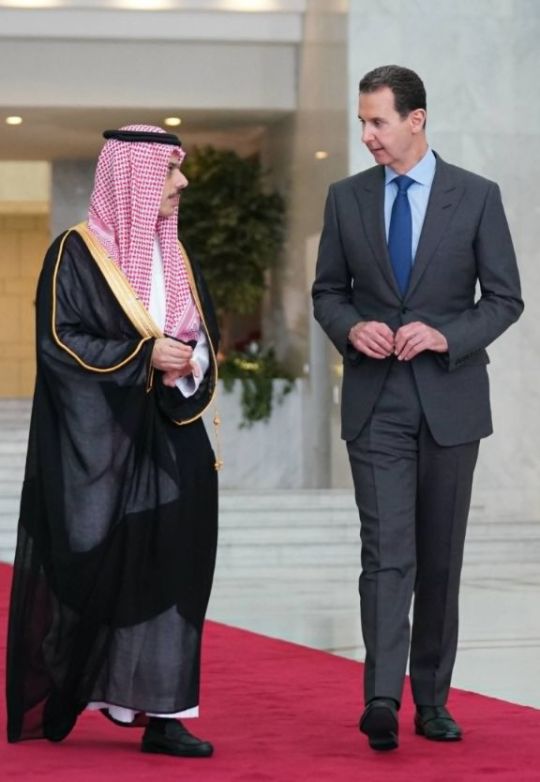
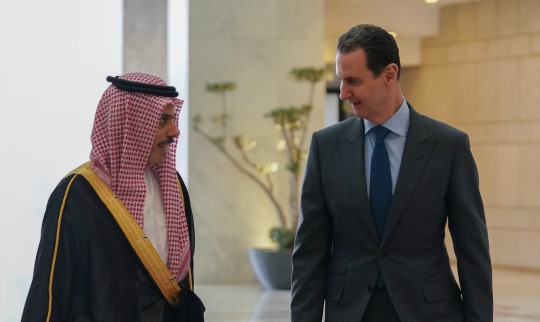


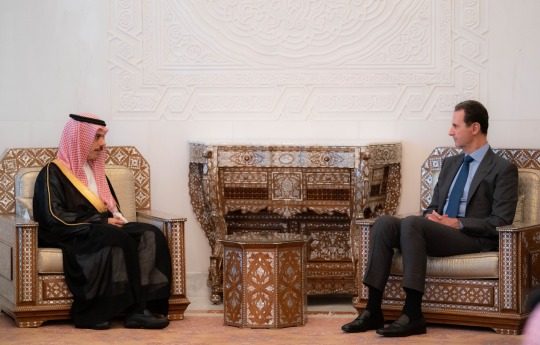
Syrian President Bashar al-Assad meeting Saudi Foreign Minister Faisal bin Farhan al-Saud in Damascus, Syria today, 18 April 2023
2 notes
·
View notes